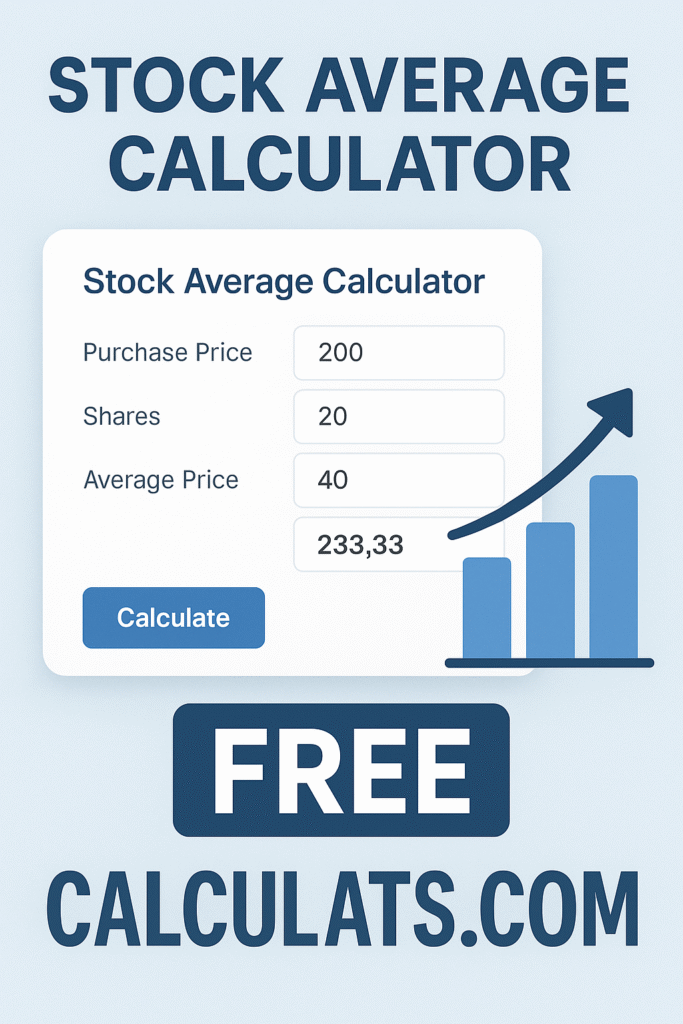Stock Average Calculator
Master Portfolio Management With Our
Free Stock Average Calculator
📊 Stock Average Calculator
Purchase #1
Portfolio Summary
Total Investment
$5,000.00
Current Value
$6,000.00
Total Shares
100
Average Cost
$50.00
Total Profit
+$1,000.00
ROI
20%
Master Your Investments: The Ultimate Guide to Using a Stock Average Calculator
Introduction- Stock Average Calculator

Investing in the stock market requires precision, strategy, and the right tools to maximize returns. One such essential tool for modern investors is the Stock Average Calculator. Whether you’re a novice trader or a seasoned investor, this guide will explain what a stock average calculator is, why it’s indispensable for portfolio management, and how to use it effectively. By the end, you’ll understand how this tool can transform your investment strategy while saving time and reducing risk.
What Is a Stock Average Calculator?
A Stock Average Calculator is a digital tool designed to help investors calculate the average cost of their stock holdings across multiple purchases. It factors in variables like:
Purchase prices per share
Number of shares bought
Transaction fees
Current market price
By analyzing these inputs, the calculator provides critical metrics such as:
Average cost per share
Total investment value
Current portfolio value
Profit/loss (both absolute and percentage terms)
Return on Investment (ROI)
This tool eliminates manual calculations, reduces errors, and offers real-time insights into your portfolio’s performance.
Why Every Investor Needs a Stock Average Calculator
1. Simplify "Averaging Down" Strategies
“Averaging down” involves buying more shares of a stock as its price drops to lower your average cost basis. While this strategy can boost long-term gains, manually tracking multiple purchases is tedious. A stock average calculator automates this process, instantly showing how new purchases affect your average price and projected returns.
2. Track Portfolio Performance in Real Time
Markets fluctuate constantly, and timely decisions are crucial. A stock average calculator updates your profit/loss and ROI as you adjust inputs, helping you:
Identify underperforming stocks
Decide when to hold, sell, or buy more
Evaluate the impact of market changes
3. Optimize Tax Planning
Understanding your average cost basis is vital for tax reporting, especially when calculating capital gains. The tool ensures accuracy, helping you avoid costly errors during tax season.
4. Manage Multiple Entries Effortlessly
For investors with diversified portfolios, tracking dozens of transactions across stocks is challenging. Advanced calculators allow adding unlimited entries, each with its own price, quantity, and fees, to compute overall performance.
5. Make Data-Driven Decisions
Emotions often cloud investment decisions. By relying on concrete data from the calculator, you can objectively assess whether a stock aligns with your financial goals.
How Does a Stock Average Calculator Work?
Modern stock average calculators use a straightforward formula to determine your average cost:
Average Cost Per Share = Total Investment / Total Shares
Where:
Total Investment = Σ (Price per Share × Quantity + Fees)
Total Shares = Σ Quantity
The calculator also computes:
Current Value = Total Shares × Current Market Price
Profit/Loss = Current Value − Total Investment
ROI = (Profit/Loss ÷ Total Investment) × 100
Advanced versions include interactive sliders, visualizations, and scenario analysis to enhance usability.
Step-by-Step Guide to Using the Stock Average Calculator
Let’s walk through using a professional-grade calculator (like the one provided in the HTML code earlier):
Step 1: Add Your Purchases
Click “Add New Purchase” to create an entry.
Input:
Purchase Price per Share (e.g., $50)
Number of Shares (e.g., 100)
Fees (if applicable)
Repeat for all transactions.
Step 2: Input Current Market Price
Enter the stock’s latest price to evaluate your holdings against the market.
Step 3: Analyze Results
The calculator instantly displays:
Total Shares Owned
Average Cost Per Share
Total Invested vs. Current Value
Profit/Loss (with color-coded positive/negative indicators)
ROI Percentage
Step 4: Adjust and Optimize
Use sliders or manual inputs to test scenarios:
“What if I buy 50 more shares at $45?”
“How does a 10% price drop affect my returns?”
Key Features of an Advanced Stock Average Calculator
Multiple Entry Support
Track unlimited purchases with individual fees and dates.
Interactive Sliders
Adjust prices and quantities visually to simulate market changes.
Real-Time Visualizations
Progress bars and charts display profit/loss trends at a glance.
Portfolio Summary
A consolidated view of key metrics:
Total investment
Current value
Average cost
ROI
Mobile Responsiveness
Use the tool seamlessly on desktops, tablets, or smartphones.
Benefits of an advanced stock calculator for investors
Using a stock average calculator aligns with smart investing practices praised by financial experts:
Risk Mitigation
Avoid overpaying for stocks by understanding your true cost basis.
Time Efficiency
Replace spreadsheets and manual math with instant calculations.
Informed Strategy
Identify optimal entry/exit points based on data, not emotions.
Tax Efficiency
Accurately report gains/losses to minimize tax liabilities.
Do you know who should use this tool?
Long-Term Investors monitoring dollar-cost averaging strategies.
Active Traders managing frequent buys/sells.
Beginners learning portfolio management basics.
Financial Advisors presenting clear insights to clients.
Conclusion: Stock Average Calculator
A Stock Average Calculator is more than just a number-crunching tool—it’s a strategic ally in your investment journey. By providing clarity on your portfolio’s performance, it empowers you to make confident, data-backed decisions.
Ready to take control? Embed the calculator on your website (as shown in the HTML/CSS/JS code provided earlier) or use it privately to refine your strategy. In an era where every dollar counts, leveraging technology like this could mean the difference between mediocre returns and financial success.
